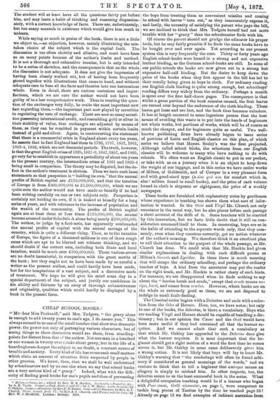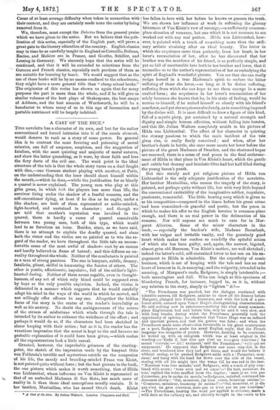CHEAP SCHOOL BOOKS.* " MY dear Miss Pecksuiff," said Mrs.
Todgers, " the gravy alone is enough to add twenty years to one's age, I do assure you." This always seemed to us one of the small touches that show true dramatic power, the power not only of portraying various characters, but of seeing things as these characters would see them, from standing- points far distant from that of the author. Not one man in a hundred or one woman in twenty ever thinks about gravy, but in the life of a boardinghouse-keeper the subject is, no doubt, a constant source of trouble and anxiety. Every kind of life has so me such small matters which claim an amount of attention little suspected by people in other grooves. We know, then, that we shall be well understood by schoolmasters and by no one else when we say that school books are a very serious kind of " gravy." Indeed, what with the diffi- culty of finding good books for one's pupils and then of preventing
]Htiots,—Comas,&e.; edited by Bev. H. B. If uckhs. Goldsmith.—Traveller, Sc.; by A. Vardy. Comper,—Task, Books I. and IV.; by J. W. Hales. Latin Delectus; by C. Oakley. Casein—Selections; by RevX. B. Butler. Ovid—Select Passages; by Bev. A. J. Church. Virgil, Aeneid, Book VI.; by Rev.A. J. Church, and Horace,—Select Odes; by Bev. W. J. Brodribb. London; Seeteys. 1871.
the boys from treating them as convenient missiles and coming to school with leaves " torn out," as they inaccurately express it, and lastly, the necessity of satisfying the parent who pays the bill, we are inclined to think that Mre. Todgers herself had not more trouble with her " gravy " than the schoolmaster finds with his.
Of course the parent should not grudge the educator his proper tools, but he may fairly grumble if he finds the same books have to be bought over and over again. Yet according to our present system this is very frequently the case. Thirty or forty years ago English school-books were bound in a strong and not expensive leather binding, as the German school-books are still. In some of our public schools the books are now given out in a strong but expensive half-calf binding. But the desire to keep down the price of the books when they first appear in the bill has led to their usually being given to boys in cloth. For ordinary reading our English cloth binding is quite strong enough, but schoolboys' reading differs very widely from the ordinary. Perhaps a month is spent over the first half-dozen pages. The consequence is that whilst a great portion of the book remains unused, the first leaves are turned over beyond the endurance of the cloth binding. These leaves get loose and are lost, and the book thus becomes valueless. It has at length occurred to some ingenious person that the best means of avoiding this waste is to put into the hands of beginners not whole works, but portions of works, which will be of course so much the cheaper, and for beginners quite as useful. Two well- known publishing firms have already begun to issue series of portions of Latin and English classics on this plan, of which series we believe that Messrs. Seeley's was the first projected. Although called school bOoks, the selections from our English classics will be welcome to many who have nothing to do with schools. We often want an English classic to pat in our pocket, or take with us on a journey when it ie an object to keep down the weight of our luggage, and in this series we have entire works of Milton, of Goldsmith, and of Cowper in a very pleasant form and with good-sized type (a sine gud non for comfort which is, alas ! seldom found in small books), and the price of each volume bound in cloth is sixpence or eightpence, the price of a weekly newspaper.
These books are furnished with explanatory notes by gentlemen whose experience in teaching has shown them what sort of infor- mation is wanted. In the Ovid and Virgil Mr. Church not only annotates in the usual way, but he also places before each passage a short account of the drift of it. Some teachers will be startled by this innovation, but we have little doubt that it will on con- sideration commend itself to them. In construing, boys are so in the habit of attending to the separate words only, that they com- monly, even when they construe correctly, get no notion whatever of the author's meaning. We therefore think it an excellent plan to call their attention to the purport of the whole passage, as Mr. Church has done. We could wish that Mr. Huckin had given similar explanations in dealing with such difficult poems as Milton's Sonnets and Lycidas. In these there is much meaning that will escape the ordinary schoolboy, and perhaps the ordinary teacher of boys. A hint from the annotator may put the reader on the right track, and Mr. Huckin is rather chary of such hints. For instance, we are disappointed when he finds nothing to say about the " berries harsh and crude," except that crude means un- ripe, hard, and comes from crudus. However, where books are on the whole so extremely good as these, we are not disposed to indulge in small fault-finding.
The Classical series begins with a Delectus and ends with a selec- tion from the Odes of Horace. Here, too, we have notes ; but only to one of the books, the delectus, is there a vocabulary. Boys who are reading Virgil and Horace should be capable of handling a dic- tionary ; but in our opinion the Cesar and the Ovid would have been more useful if they had contained all that the learner re- quires. And we cannot admit that such a vocabulary as that which Mr. Oakley has appended to the Delectus does give what the learner requires. It is moat important that the be-
ginner should get a right motion of a word the first time he comes across it, but Mr..Oakley in some cases deliberately given him
a wrong notion. It is not likely that boys will lay to heart Mr.
Oakley's warning that "the renderings will often be found arbi- trary if considered as general meanings of the words," and we venture to think that to tell a beginner that ambages means an allegory is simply to mislead him. In other respects, too, the delectus seems to us the least successful book in the series. What
a delightful occupation teaching would be if a learner who began with Peer amat, Galli vincuntur, on page 1, were competent to tackle long pieces of Tacitus by the time he reached page 25 ! Already on page 13 we find examples of indirect narration front
Caesar of at least average difficulty when taken in connection with their context, and they are certainly made none the easier by being removed from it.
We, therefore, must except the DeIsaias from the general praise which we have given to the series. But we believe that the pub- lication of this series, especially of the English part, will prove a great gain to the literary education of the country. English classics may in time be as carefully taught in England as Corneille, Boileau, Racine, and Moliere are in France, and Goethe, Schiller, and Leasing in Germany. We sincerely hope that the series will be continued, and that it will be extended to selections from the German and French classics, especially such portions of them as are suitable for learning by heart. We would suggest that as the use of these books will be by no means confined to the schoolroom, they might have a more general title than " cheap school books." The originator of this series has shown us again that for many purposes the part is more than the whole, and if he will give us similar volumes of the best plays of Shakespeare, the best essays of Addison, and the best sonnets of Wordsworth, he will be a benefactor to whom many of us in this age of locomotion and portable nutriment will be largely indebted.



































 Previous page
Previous page